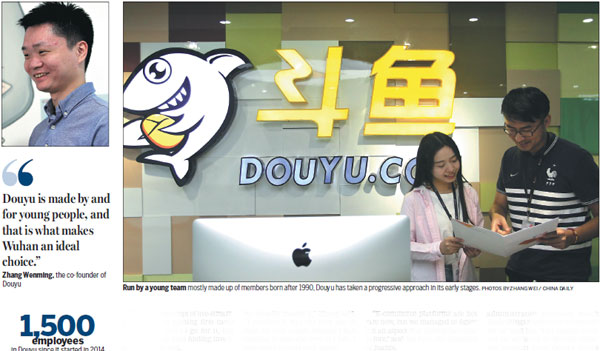Software park gathering place for young professionals
As the Chinese economy enters the new normal with its growth rate slowing, innovation has been placed at a core position in China's overall development. China Daily recently interviewed people involved with a leading State-level innovation pilot zone, Optics Valley of China in Wuhan. This series of reports will use the valley's case as an example of what China has done to boost innovation and the difficulties and challenges faced.
Located in Wuhan's Optics Valley Software Park, the F4 building looks just like an average office block from the outside: humble and grey, there is nothing special about it.
However, this place has already become a landmark among internet startups in Wuhan - home to four leading internet companies, two of which are "unicorns" with founders born after the 1980s.
A "unicorn" is the name given to startup companies with an estimated value of over one billion dollars, but it also has a positive influence on the development and upgrading of the entire industry.
The question is, how and why did young and ambitious entrepreneurs build up their internet empire in Optics Valley of Wuhan, a city in the middle of China, a thousand miles away from the established technology centers like Beijing, Shanghai or Guangzhou?
The abundance of Wuhan's human resources may be the answer.
Known as the "city of universities", Wuhan has 85 higher education institutions and the world's largest number of undergraduates, more than one million.
The sheer quantity of affordable young professionals has attracted entrepreneurs to the city, seeking the dynamic, ambitious and creative young blood like their own.
"Douyu is made by and for young people, and that is what makes Wuhan an ideal choice," said Zhang Wenming, the co-founder of Douyu, one of the first internet companies in China to pioneer online competitive game streaming.
"With such a big population of undergraduates, Wuhan is our largest market and talent pool."
After only two years since it started in 2014, Douyu employs more than 1,500 people.
The progressive strategy and rapid growth reflect what its name has indicated: Douyu means Siamese fighting fish in Chinese, a very aggressive and territorial species that can only be raised alone.
"When the concept of live-streaming for online gaming first came out, we decided to go for it, but we had a hard time finding investment," Zhang said.
"There was no previous experience to draw from, and most of the investors are too old to understand the concept.
"It has a huge market potential that only young people can possibly understand," Zhang said.
"After we got our first investment of $3 million, we assumed it could keep the company running for at least half a year, but we quickly burned through the cash within two months.
"We were very radical in the beginning and we hired the world's top game players to play for us. But our fearless action paid off, we have not only occupied the entire market, we actually created it," Zhang said. "I realized it was the best age to start my own career, because I had nothing to lose and even if I lost, I can afford to start over again."
Douyu has done its best to create a comfortable working environment for young people - buffet fruit and snack bar, a chill-out zone with swings, video games and VR game equipment.
"We keep our staff staying innovative and never bored by their work," said Xu Juanjuan, senior PR director.
But Douyu is not the only one-billion-dollar company led and run by recent graduates.
On the second floor of the same building, Juanpi, an e-commerce platform, just won the title of unicorn enterprise, becoming Wuhan's second internet giant.
"E-commerce platforms are not rare now, but we managed to figure out an aspect that nobody has done before," said Xia Kurt, the president of Juanpi.
"We not only offer goods, but also a service to help customers to pick the goods with a high price-performance ratio."
Being a graduate from Wuhan himself, Xia recognizes Wuhan as a city with great potential.
"Optics Valley is the place where young talents go to look for a job now," said Xia.
"There is a large population of young professionals."
Apart from the human resources, Xia acknowledged that support from local government has played an important part in Juanpi's success.
"They cut many unnecessary administration processes, which made things much more convenient for us," said Xia. "Our success could not be achieved so quickly under the support from Optics Valley alone. The policy from the government helped, too."
Speaking on the future, Xia is positive but hopes the government can go a step further to better serve tech startups in Wuhan.
"I hope the government can help upgrade the human resources structure," Xia said.
"Unlike Guangzhou or Shanghai, we lack the necessary labor for senior positions and certain positions, such as senior marketing, product management, etc."
Contact the writers at zhuanti@chinadaily.com.cn and zhoulihua@chinadaily.com.cn



















